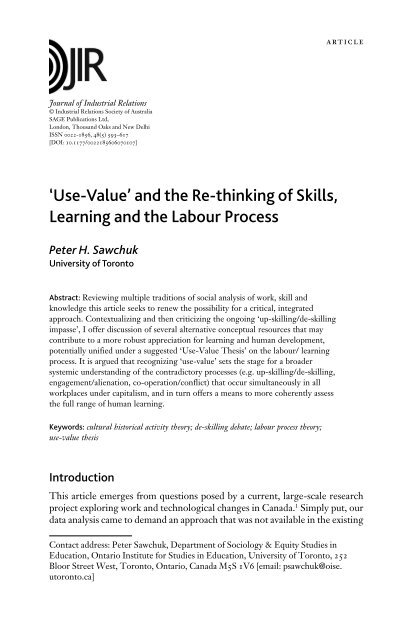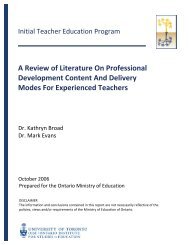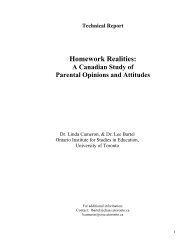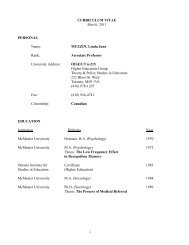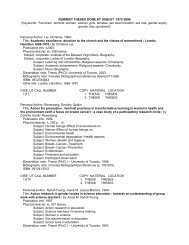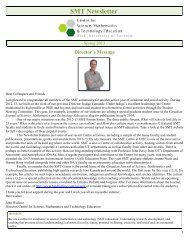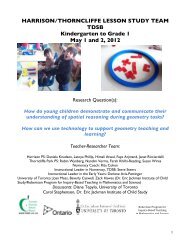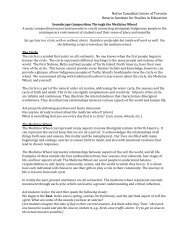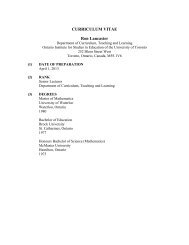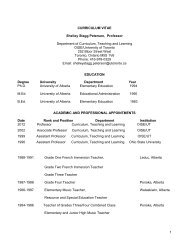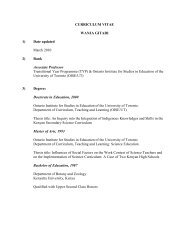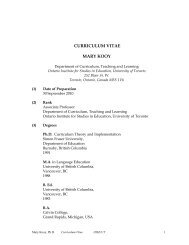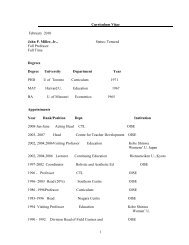'Use-Value' and the Re-thinking of Skills, Learning and the Labour ...
'Use-Value' and the Re-thinking of Skills, Learning and the Labour ...
'Use-Value' and the Re-thinking of Skills, Learning and the Labour ...
You also want an ePaper? Increase the reach of your titles
YUMPU automatically turns print PDFs into web optimized ePapers that Google loves.
Journal <strong>of</strong> Industrial <strong>Re</strong>lations 48(5)defined, measured, <strong>and</strong> evaluated for someone else’s purposes… But I will argue herethat it [also] has <strong>the</strong> effect <strong>of</strong> disorganizing vocational activity for <strong>the</strong> purposes <strong>of</strong> <strong>the</strong>individuals whose ‘need’ is to master it as a form <strong>of</strong> practical action. (Jackson, 1994:344)The key issues raised by Jackson, for our discussion, are (i) <strong>the</strong> dearth <strong>of</strong>conceptual means to draw distinctions between managerial/designer basedunderst<strong>and</strong>ings <strong>of</strong> vocational knowledge <strong>and</strong> <strong>the</strong> actual, practical work, skill<strong>and</strong> knowledge activity, (ii) <strong>the</strong> persistent, fundamental epistemological denial<strong>of</strong> <strong>the</strong> acting <strong>and</strong> knowing subject, <strong>and</strong> finally (iii) <strong>the</strong> socially reproductiveeffects that <strong>the</strong>se dominant presumptions actually have in ‘disorganizing’ <strong>the</strong>potential <strong>of</strong> workers to individually/collectively work, learn <strong>and</strong> develop in<strong>the</strong>ir own terms. Influenced by <strong>the</strong> Marxist-feminist sociology <strong>of</strong> DorothySmith, Jackson argues for an analysis that recovers people as subjects <strong>of</strong> <strong>the</strong>irlabour, ra<strong>the</strong>r than merely objects <strong>of</strong> control. She concludes by advocating avariety <strong>of</strong> socio-cultural schools <strong>of</strong> thought – among <strong>the</strong>m Cultural HistoricalActivity Theory – as an important foundation for more adequate analysis <strong>of</strong>skill <strong>and</strong> knowledge development.While not a comprehensive response to <strong>the</strong> issues raised by Jackson, onehopeful contribution toward a substantive model <strong>of</strong> skill itself is found in work<strong>of</strong> A. Aneesh where it’s argued that,[t]here is a need to reconceptualize [Braverman’s] <strong>the</strong>sis about skills <strong>and</strong> develop newcriteria for <strong>the</strong> underst<strong>and</strong>ing <strong>of</strong> skills. I seek to lift <strong>the</strong> debate out <strong>of</strong> <strong>the</strong> de-skillingvs. re-skilling confusion, developing an alternate set <strong>of</strong> analytical tools to makesense <strong>of</strong> skills, especially in view <strong>of</strong> <strong>the</strong> transformations associated with informationtechnologies. I attempt to focus on deeper structures <strong>of</strong> skills independent <strong>of</strong> <strong>the</strong>question <strong>of</strong> whe<strong>the</strong>r de-skilling plagues all industries… The concept <strong>of</strong> skill saturationseeks to evaluate skills solely on <strong>the</strong> basis <strong>of</strong> <strong>the</strong>ir grammar <strong>and</strong> structures… It does notallude to <strong>the</strong> consciousness – obscure or obvious – <strong>of</strong> <strong>the</strong> manager or <strong>the</strong> worker, nordoes it refer skills to <strong>the</strong> will <strong>of</strong> <strong>the</strong> work designers… (Aneesh, 2001: 365–6)This analysis <strong>of</strong> saturated versus unsaturated skill is well-worth noting. <strong>Skills</strong>aturation is defined by Aneesh as <strong>the</strong> closure <strong>of</strong> <strong>the</strong> space for play leading topredictability <strong>of</strong> procedure <strong>and</strong> outcome ‘resulting from <strong>the</strong> exhaustive ordering<strong>of</strong> various components <strong>of</strong> skill <strong>and</strong> <strong>the</strong> elimination <strong>of</strong> all irregular spaces <strong>of</strong>work’ (2001:363–4). Unsaturated skills, on <strong>the</strong> o<strong>the</strong>r h<strong>and</strong>,…tend to contain multiple bonds with <strong>the</strong> job <strong>and</strong> certain unanalyzed dimensionsto allow enough room for action to take place, an action based on long <strong>and</strong> intuitiveunderst<strong>and</strong>ing. It implies engagement that is implicit, inherent, <strong>and</strong> defies clearvisibility. Michael Polanyi’s concept <strong>of</strong> ‘tacit dimension’ may allow us to underst<strong>and</strong>how <strong>the</strong> unqualified process <strong>of</strong> <strong>the</strong> formalization <strong>of</strong> skills leads to completepredictability, <strong>and</strong> eliminates <strong>the</strong> elements <strong>of</strong> creative freedom <strong>and</strong> discovery. Polanyiexplained tacit dimension as something that remains unanalyzable in action…. Manycreative skills are performed <strong>and</strong> learned by ‘indwelling’ <strong>and</strong> ‘interiorization,’ ra<strong>the</strong>rthan by explicit, formalized knowledge. (Aneesh, 2001: 373–4)Importantly, Aneesh’s model helps us break open some <strong>of</strong> <strong>the</strong> contradictoryclaims that permeate <strong>the</strong> up-skilling/de-skilling impasse, providing a means602
Sawchuk: ‘Use-Value’ <strong>and</strong> <strong>the</strong> <strong>Re</strong>-<strong>thinking</strong> <strong>of</strong> <strong>Skills</strong><strong>of</strong> more adequately <strong>the</strong>orizing Jackson’s acting/knowing subject for example.His model helps us see that <strong>the</strong> type <strong>of</strong> skilled, semi-skilled <strong>and</strong> un-skilledcategorizations <strong>of</strong> a coding system like <strong>the</strong> Dictionary <strong>of</strong> Occupational Titlesmay in fact miss a crucial point. Many jobs, conventionally defined, may exhibitunexpected levels <strong>of</strong> both closure <strong>and</strong> openness as defined by <strong>the</strong> ‘saturated–unsaturated’ continuum, particularly when actual work activity is looked atclosely in such a way as to reveal both its conscious <strong>and</strong> tacit dimensions (seeSawchuk, 2003, Chapter 4). This breaking up <strong>of</strong> conventional, presumedhierarchies <strong>of</strong> skill/knowledge is helped fur<strong>the</strong>r by challenging <strong>the</strong> arbitrarystraight-jacket that defines legitimized goals, interests <strong>and</strong> activity from astrictly organizational st<strong>and</strong>point. 4 Thus, work that is formally deemed to behighly skilled may at moments exhibit enormously ‘saturated’ elements, just asapparently unskilled, routinized work frequently obscure enormous evidence<strong>of</strong> play, hidden ‘tricks-<strong>of</strong>-<strong>the</strong> trade’ <strong>and</strong> subversion. In fact, <strong>the</strong> corpus <strong>of</strong> work/skill ethnography suggests exactly <strong>the</strong>se forms <strong>of</strong> contradictory complexity. At<strong>the</strong> same time, it will be apparent that <strong>the</strong>re is an instructive contrast betweenAneesh’s <strong>and</strong> Jackson’s assessments: Aneesh’s eschewing <strong>of</strong> <strong>the</strong> importance<strong>of</strong> particular social st<strong>and</strong>points, his claim <strong>of</strong> saturation as a more substantivemeans <strong>of</strong> identifying de-skilling, <strong>and</strong> its effect <strong>of</strong> regularizing work on <strong>the</strong> oneh<strong>and</strong>, <strong>and</strong> Jackson’s argument for <strong>the</strong> centrality <strong>of</strong> recognizing social st<strong>and</strong>points<strong>and</strong> her claim that managerial control <strong>and</strong> objectification may actuallydisorganize work/learning activity on <strong>the</strong> o<strong>the</strong>r. How are we to reconcile <strong>the</strong>seseemingly contradictory accounts while maintaining <strong>the</strong> kind <strong>of</strong> critical, politicaleconomic perspective that Adler calls for?From <strong>the</strong> field <strong>of</strong> educational studies comes a unifying conceptualizationthat begins to help us address such questions. Glenn Rikowski (e.g. 2002a,2002b) begins from Marxist <strong>the</strong>ory <strong>and</strong> exp<strong>and</strong>s <strong>the</strong> issue <strong>of</strong> skill, education,training <strong>and</strong> informal learning to all work-based activity as examples <strong>of</strong> a singularphenomenon: <strong>the</strong> linkage <strong>of</strong> labour-power <strong>and</strong> <strong>the</strong> notion <strong>of</strong> personhood:…labour-power is a complex phenomenon with inherent contradictions <strong>and</strong> tensionsthat become incorporated within personhood – given labour-power’s fusion with <strong>the</strong>person <strong>of</strong> <strong>the</strong> labourer… However, as well as <strong>the</strong>se diverse aspects <strong>of</strong> <strong>the</strong> unified socialforce that is labour-power, <strong>the</strong>re is a deeper rift that de-stabilises labour-power <strong>and</strong><strong>the</strong> person within which its force flows. <strong>Labour</strong>-power, which takes <strong>the</strong> form <strong>of</strong> humancapital, is at odds with <strong>the</strong> person (de facto with itself) as not-labour-power; <strong>the</strong> personwith interests, desires, motives (with dreams even) that run counter to <strong>the</strong> subsumption<strong>of</strong> <strong>the</strong> self as labour-power. The antagonistic labour–capital relation is a relation withinpersonhood too in capitalist society. Our existence as labour against capital (as opposedto labour within <strong>and</strong> as capital) places a limit on <strong>the</strong> capitalisation <strong>of</strong> our souls…(Rikowski, 2002a: 15–16)Rikowski (2002b) goes on to list an exhaustive series <strong>of</strong> qualities, attributes <strong>and</strong>aspects <strong>of</strong> labour-power, <strong>and</strong> recovers Marx’s original claims <strong>of</strong> its singularlyunique ability (against all o<strong>the</strong>r commodities) to create value, <strong>and</strong> in <strong>the</strong> processhelps us identify this contested, core relationship: ‘The labour-power <strong>of</strong><strong>the</strong> labourer is under <strong>the</strong> sway <strong>of</strong> a potentially hostile will, a will that also exists603
Sawchuk: ‘Use-Value’ <strong>and</strong> <strong>the</strong> <strong>Re</strong>-<strong>thinking</strong> <strong>of</strong> <strong>Skills</strong>tage <strong>and</strong> so on (e.g. Ackroyd <strong>and</strong> Thompson, 1999; Roscigno <strong>and</strong> Hodson,2004). As Hampson <strong>and</strong> Junor put it,‘Work’ does not mean only ‘hard labour’ (‘ponos’), since work can sometimes become‘play’. Equally, a diversity <strong>of</strong> forms <strong>of</strong> action like play, games, casual conversation,expressive action, emotional action <strong>and</strong> symbolic action (like <strong>the</strong> devotional, <strong>the</strong>sacrificial, <strong>the</strong> sacred) is, at times, at least partially constituted by ‘work’. (2005:168)Likewise, Korczynski (2002) comes very close to this basic analysis in recognizing<strong>the</strong> ‘contradictions’ that undermine any simple dichotomy <strong>of</strong> ‘good’ <strong>and</strong>‘bad’ work. Workers do find joy <strong>and</strong> engagement as well as conflict, stress,frustration <strong>and</strong> alienation, as he notes, making for a ‘fragile social order’. WhatKorczynski does not register is that this fragility has systematic roots in <strong>the</strong>contradiction between use-value <strong>and</strong> exchange-value dimensions <strong>of</strong> organizationallife, specific in its form to capitalism.The Use-value Thesis, in this sense, places this type <strong>of</strong> contradictory ‘paralleluniverse’ that prevails in all capitalist workplaces at <strong>the</strong> centre <strong>of</strong> work/skillanalysis. This central contradiction anticipates varying degrees <strong>of</strong> both cooperation<strong>and</strong> conflict, both engagement <strong>and</strong> alienation, both up-skilling <strong>and</strong>de-skilling simultaneously within <strong>the</strong> same work environment. As a summaryacross <strong>the</strong> research attests, with particular attention to <strong>the</strong> foundationestablished by <strong>the</strong> work <strong>of</strong> Burawoy, such dynamics simply are not mutuallyexclusive, <strong>and</strong> <strong>the</strong> Use-value Thesis, in this sense, contributes a unifying explanationwhy, under capitalism, this is necessarily <strong>the</strong> case.The work <strong>of</strong> <strong>the</strong> four authors reviewed above can be understood in relationto this dialectic <strong>of</strong> use-value/exchange value. For this, we can pay particularattention to <strong>the</strong>ir discussions <strong>of</strong> distinctive contradictory relations (roughlysummarized for each author as follows):• Socialization <strong>of</strong> Forces <strong>of</strong> Production versus <strong>the</strong> <strong>Re</strong>lations <strong>of</strong> Production<strong>and</strong> Capitalist Pr<strong>of</strong>itability (Adler):• Practical Action/Knowing Subjects versus Objectifying Managerial Control(Jackson):• Unsaturated Skill/Play versus Saturated Skill/Rationalized Procedure(Aneesh): <strong>and</strong>• <strong>Labour</strong>-Against-Capital versus <strong>Labour</strong>-As-Capital (Rikowski).The linkage between work <strong>and</strong> learning as understood by a Use-value Thesisis inherent in, as Rikowski puts it, ‘labour-power’s fusion with <strong>the</strong> person’.<strong>Learning</strong>, as I comment elsewhere, is <strong>the</strong> labour we do on ourselves <strong>and</strong> thislabouring also teaches us whe<strong>the</strong>r this learning is deemed legitimate or not.Given that labour is constituted by both use-value <strong>and</strong> exchange-value productionwe can speak in <strong>the</strong> same terms <strong>of</strong> learning. Of course, as valuable as itmay be to raise <strong>the</strong> questions <strong>and</strong> issues above, <strong>the</strong>re is still a good deal missingregarding tools for a coherent empirical program <strong>and</strong> syn<strong>the</strong>sis. In this sense,both Jackson’s (1994) <strong>and</strong> Adler’s (2006) explicit suggestions for a turn towardsocio-cultural approaches to learning are relevant.The lack <strong>of</strong> attention to actual processes <strong>of</strong> human development <strong>and</strong> activity,605
Journal <strong>of</strong> Industrial <strong>Re</strong>lations 48(5)<strong>and</strong> <strong>the</strong> lack <strong>of</strong> attention to <strong>the</strong> ‘knowing <strong>and</strong> acting subject’ within analyses<strong>of</strong> <strong>the</strong> labour process appears chronic; a condition which virtually assures <strong>the</strong>maintenance <strong>of</strong> <strong>the</strong> up-skilling/de-skilling impasse on <strong>the</strong> one h<strong>and</strong>, <strong>and</strong> <strong>the</strong>tendency to ‘de-Marxify’ LPT on <strong>the</strong> o<strong>the</strong>r. Likewise, <strong>the</strong> obfuscating <strong>and</strong>persistent characterizations <strong>of</strong> so-called ‘optimistic’ or ‘pessimistic’ approachesto skill in many ways signal that <strong>the</strong> up-skilling/de-skilling impasse is holdingfirm.How does <strong>the</strong> Use-value Thesis open up new ground for integrated LPTresearch? It does so by, first, inherently linking labour process <strong>and</strong> labourpowerconcepts to socio-cultural <strong>the</strong>oretical traditions such as CHAT thathave <strong>the</strong> capacity to <strong>of</strong>fer detailed, expansive, empirical analyses <strong>of</strong> <strong>the</strong> actualhuman developmental process. Second, it provides <strong>the</strong> capacity to identify <strong>and</strong>track interwoven ‘trajectories <strong>of</strong> activity’ (i.e. learning <strong>and</strong> human development;Sawchuk, 2003) that always co-exist but which account for radically differentexpansive <strong>and</strong>/or restrictive learning environments <strong>and</strong> outcomes. Drawing onAneesh’s (2001) formulation, for example, while a set <strong>of</strong> occupational skills maybe assessed as leaning toward <strong>the</strong> saturated end <strong>of</strong> his ‘saturated–unsaturated’continuum model (leaving little room for discretion <strong>and</strong> play) this may simplybe accurate for those activities defined as organizationally legitimate, that isinvolving processes that convert labour-power into surplus value <strong>and</strong> ultimatelyexchange-value <strong>and</strong> pr<strong>of</strong>itability. If we are to pay attention to Marx, as Adler<strong>and</strong> Rikowski do, we might recognize <strong>the</strong> importance <strong>of</strong> actively registering<strong>the</strong> dialectic <strong>of</strong> exchange-value <strong>and</strong> use-value production.Implications <strong>of</strong> <strong>the</strong> Use-value ThesisIt may seem odd that ‘use-value’ appears to take centre-stage in my argument,but this is a matter <strong>of</strong> strategic emphasis <strong>and</strong> an interest to frame <strong>the</strong>labour process historically. After all, at a basic level, <strong>the</strong> idea <strong>of</strong> exchangevalueoriented production hardly needs to be explained. It is <strong>the</strong> production<strong>of</strong> exchange-value that (quite logically under capitalism) governs <strong>the</strong> majority<strong>of</strong> practical planning, design <strong>and</strong> control within <strong>the</strong> institution <strong>of</strong> paid work.Whatever <strong>the</strong> specific issues <strong>of</strong> contention, how many times have industrialrelations conflicts pivoted on <strong>the</strong> question: If <strong>the</strong> firm doesn’t survive, what’s<strong>the</strong> point? Both workers <strong>and</strong> management explicitly recognize this principle,even if <strong>the</strong> former occasionally resist <strong>and</strong> challenge it. Thus, <strong>the</strong> orientation toexchange-value production is explicitly established – logically, legally, culturally<strong>and</strong> bureaucratically – by <strong>the</strong> very nature <strong>of</strong> <strong>the</strong> enterprise. Not withst<strong>and</strong>ing,what is equally true is <strong>the</strong> fact that across historical epochs <strong>and</strong> politicaleconomic arrangements prior to <strong>and</strong> beyond capitalism, use-value productionis <strong>the</strong> common, continuous activity; a point (somewhat differently) made byTinker (2002: 271) in his discussion <strong>of</strong> Braverman. I argue that no analysis <strong>of</strong><strong>the</strong> labour process is complete without <strong>the</strong>se recognitions. This, in turns, helpsus establish <strong>the</strong> dynamic <strong>of</strong> contradictions <strong>and</strong> that in placing <strong>the</strong> relationship<strong>of</strong> use-value <strong>and</strong> exchange-value at <strong>the</strong> centre <strong>of</strong> our underst<strong>and</strong>ing <strong>of</strong> work,606
Sawchuk: ‘Use-Value’ <strong>and</strong> <strong>the</strong> <strong>Re</strong>-<strong>thinking</strong> <strong>of</strong> <strong>Skills</strong>we have a coherent way <strong>of</strong> <strong>the</strong>orizing why <strong>and</strong> how conflict <strong>and</strong> co-operation,enchantment <strong>and</strong> alienation, de-skilling <strong>and</strong> up-skilling necessarily co-exist,<strong>and</strong> <strong>the</strong>ir relationship with historical change.An important implication <strong>of</strong> <strong>the</strong> Use-value Thesis – <strong>the</strong> one most directlyapposite to analyses <strong>of</strong> work-based skill <strong>and</strong> knowledge – is that by foregroundingthis particular contradiction we can readily extend our analyses <strong>of</strong> work <strong>and</strong>political economy to <strong>the</strong> type <strong>of</strong> robust <strong>the</strong>ories <strong>of</strong> learning <strong>and</strong> human developmentadvocated, implicitly <strong>and</strong> explicitly in my discussion <strong>of</strong> ‘new resources’earlier. This brings us to <strong>the</strong> necessary relationships between notions <strong>of</strong> contradiction<strong>and</strong> <strong>the</strong>ories <strong>of</strong> learning. I anticipate that not all readers will befamiliar with <strong>the</strong> corpus <strong>of</strong> adult learning <strong>the</strong>ory as such, but today <strong>the</strong> mostpowerful analyses are ‘socio-cultural’ in nature (see Fenwick, 2001; Sawchuk,2003 2006b, in press), <strong>and</strong> in particular it is <strong>the</strong>ories <strong>of</strong> activity or CHAT thatst<strong>and</strong> out in terms <strong>of</strong> <strong>the</strong>ir integration <strong>of</strong> issues <strong>of</strong> human development withnotions <strong>of</strong> systemic contradiction endemic to capitalism. A quick look at <strong>the</strong>recent skills literature (e.g. <strong>the</strong> collection by Warhurst et al., 2004), reveals areferential knowledge <strong>of</strong> <strong>the</strong> likes <strong>of</strong> Lave <strong>and</strong> Wenger, Barley <strong>and</strong> Orr. Theseauthors contribute important elements to many sociology <strong>of</strong> work <strong>and</strong> LPTefforts. However, important gaps remain in comparison to CHAT perspectives:namely, <strong>the</strong> vacuum in terms <strong>of</strong> any substantive integration <strong>of</strong> critical,political economic elements. Lave <strong>and</strong> Wenger (1991), for example, upholds<strong>the</strong> principle that <strong>the</strong> core dynamic <strong>of</strong> legitimate peripheral participation is <strong>the</strong>humanist struggle between experts <strong>and</strong> novices. The notion <strong>of</strong> conflict in itsbroader social forms – forms that deeply shape <strong>the</strong> nature <strong>of</strong> capitalist workplace– are simply not <strong>the</strong>re (see Sawchuk, 2003).Space does not permit a full elaboration <strong>and</strong> demonstration <strong>of</strong> <strong>the</strong> CHATapproach to learning <strong>and</strong> work (for this see Chaiklin, Hedegaard <strong>and</strong> Jensen,1999; Engeström, 1987, 1990, 2001; Engeström <strong>and</strong> Middleton, 1996;Engeström, Miettinen <strong>and</strong> Punamäki, 1999; Nardi, 1996; Robbins <strong>and</strong>Stetsenko, 2002; <strong>and</strong> for more explicitly politicized applications Gairey, Ng,Martin <strong>and</strong> Jackson, 2004; Livingstone <strong>and</strong> Sawchuk, 2004; Sawchuk, 2003;Sawchuk, Duarte <strong>and</strong> Elhammoumi, 2006; Wor<strong>the</strong>n, 2001). Never<strong>the</strong>less, abasic orientation is important to begin to appreciate <strong>the</strong> implications <strong>of</strong> <strong>the</strong>Use-value Thesis. The origins <strong>of</strong> <strong>the</strong> CHAT tradition lie in <strong>the</strong> radical critiqueby two <strong>of</strong> psychology’s core historical figures, Lev Vygotsky (1896–1934) <strong>and</strong>Aleksei Leont’ev (1903–1979), who toge<strong>the</strong>r challenged individualized (<strong>and</strong>apolitical) models <strong>of</strong> human development by establishing an underst<strong>and</strong>ing <strong>of</strong>how external social-material relations <strong>of</strong> participation are inseparable from,but also functionally primary to, individual skill <strong>and</strong> knowledge capacity.Against <strong>the</strong> post-structuralist critique <strong>of</strong> Braverman LPT that, with relativelylittle <strong>the</strong>oretically sophisticated challenge established a veritable monopolyover questions <strong>of</strong> <strong>the</strong> individual, CHAT <strong>of</strong>fers a deeply human, historical <strong>and</strong>materialist response to questions <strong>of</strong> self. 6CHAT <strong>of</strong>fers a non-reductionist ontological vision <strong>of</strong> human nature <strong>and</strong> developmentas being rooted in material social practices that, on <strong>the</strong> one h<strong>and</strong>, produce <strong>and</strong>607
Journal <strong>of</strong> Industrial <strong>Re</strong>lations 48(5)engender social interactions <strong>and</strong> human subjectivity, <strong>and</strong>, on <strong>the</strong> o<strong>the</strong>r h<strong>and</strong>, are<strong>the</strong>mselves reciprocally produced by <strong>the</strong>se interactions <strong>and</strong> subjectivity. (Stetsenko <strong>and</strong>Arievitch, 2004: 496)<strong>Learning</strong>, in <strong>the</strong> CHAT tradition, is defined as activity. What most peoplethink <strong>of</strong> as individual skill <strong>and</strong> knowledgeability, in <strong>the</strong> conventional sense, is<strong>the</strong> natural byproduct <strong>and</strong> currency <strong>of</strong> activity. The concept <strong>of</strong> activity – <strong>the</strong>system through which individuals <strong>and</strong> groups engage in social action mediatedby tools, symbols/discourses, rules <strong>and</strong> divisions <strong>of</strong> labour – is argued tobe <strong>the</strong> minimal, meaningful unit <strong>of</strong> analysis <strong>of</strong> human development. CHATmaintains that activity systems include <strong>the</strong> broader social-structural motives(e.g. <strong>the</strong> broader relations <strong>and</strong> forces <strong>of</strong> production), self-conscious goals <strong>and</strong>action (e.g. work tasks), as well as tacit operations (e.g. <strong>the</strong> local social <strong>and</strong> materialconditions <strong>and</strong> practices <strong>of</strong> accomplishment). Importantly, this transcends<strong>the</strong> boundaries <strong>of</strong> <strong>the</strong> many, proliferating approaches to <strong>the</strong> learning processincluding modifiers such as formal, informal, experiential, self-directed, reflective<strong>and</strong> tacit.This conceptualization <strong>of</strong> levels <strong>of</strong> activity has important implications inits own right. Of course, a variety <strong>of</strong> analytic traditions – including Polanyi,Garfinkel, G<strong>of</strong>fman, Bourdieu <strong>and</strong> in some sense even Freud, to name only afew diverse examples – have noted that people’s conscious accounts <strong>of</strong> <strong>the</strong>ir ownpractice only address a proportion <strong>of</strong> <strong>the</strong>ir practice <strong>and</strong> capacity for practice asa whole. CHAT has been clear from <strong>the</strong> beginning that practice related to <strong>the</strong>motive <strong>and</strong> operation levels <strong>of</strong> activity are not typically conscious <strong>and</strong> availablefor discursive account. Without intervention <strong>of</strong> some sort, it is only <strong>the</strong>object/goal level <strong>of</strong> activity to which people have conscious access. Obviously,ei<strong>the</strong>r interview or survey instruments unaware <strong>of</strong> this basic fact are particularlyvulnerable to <strong>the</strong> type <strong>of</strong> validity problems rooted in ‘proxy’ inferences.This applies to people’s own accounts <strong>of</strong> skilled <strong>and</strong> knowledgeable practice,<strong>and</strong> leaves interviewees/respondents with only <strong>the</strong> (web <strong>of</strong>) discourses availableto <strong>the</strong>m on which to base <strong>the</strong>ir response. Warhurst et al. (2004: 11–12) havesummarized this basic discursive dimension <strong>of</strong> skill as a ‘rhetorical device’ thatcan be both benign <strong>and</strong> misleading. However, in applying a CHAT analysis,for example, to <strong>the</strong> issue <strong>of</strong> discretion on <strong>the</strong> job, we can begin to see a range<strong>of</strong> forms <strong>of</strong> choice that nei<strong>the</strong>r workers, management, nor researchers typicallyregister. From a CHAT perspective, discretion should be assessed at alllevels <strong>of</strong> activity including: 1) <strong>the</strong> mediating artifacts, tools, technologies <strong>and</strong>discourses <strong>of</strong> production; 2) conditions <strong>of</strong> production; 3) objective or goals <strong>of</strong>production; <strong>and</strong> finally 4) <strong>the</strong> motive structure <strong>of</strong> production. This approachfur<strong>the</strong>r develops our underst<strong>and</strong>ing <strong>of</strong> <strong>the</strong> basic critiques, for example, <strong>of</strong> <strong>the</strong>quality movement, teamwork, empowerment programs or even high performanceproduction systems, as examples <strong>of</strong> constrained freedom (see Edwards<strong>and</strong> Collinson, 2002; Hales, 2000; Thompson, 2003). The fact is that, againstall <strong>the</strong>se dimensions <strong>of</strong> possible discretion, research instruments tend to reportonly on number three (<strong>the</strong> object/goals <strong>of</strong> activity) suggesting, at <strong>the</strong> very least,conservative evaluations. The quantitative research that perhaps comes <strong>the</strong>608
Journal <strong>of</strong> Industrial <strong>Re</strong>lations 48(5)environments. In ei<strong>the</strong>r case, conceptualizing <strong>the</strong>se trajectories describesinterwoven patterns <strong>of</strong> individual <strong>and</strong> collective human development – inclusive<strong>of</strong> formalized training, informal learning, intentional <strong>and</strong> tacit learningas well as <strong>the</strong> proliferating forms <strong>of</strong> skill <strong>the</strong> research has continued to throwforward – <strong>and</strong> allows us to underst<strong>and</strong>, <strong>and</strong> indeed partially predict, <strong>the</strong> specificforms <strong>of</strong> skill <strong>and</strong> knowledge that emerge, even in <strong>the</strong> case where <strong>the</strong>y appearsuperficially as a ‘failure to learn’ (<strong>the</strong>re is in fact no such thing – <strong>the</strong>re is onlya failure to learn some things as opposed to o<strong>the</strong>rs).In summary, if as is claimed learning occurs through <strong>the</strong> resolution <strong>of</strong> variouscontradictions, it not only behoves us to recognize its most primary form(use-value/exchange-value relations), but in so doing it allows us to empiricallylink <strong>the</strong> labour process with more robust analyses <strong>of</strong> actual human development.This represents a level <strong>of</strong> analysis that remains largely implicit insociology <strong>of</strong> work <strong>and</strong> LPT currently; implicitness that contributes significantlyto what I’ve termed <strong>the</strong> ‘up-skilling/de-skilling impasse’. Sociology <strong>of</strong>work <strong>and</strong> LPT <strong>of</strong>fer enormously important empirical clarification <strong>of</strong> manykey elements central to a CHAT approach to work-based learning includingdetailed descriptions <strong>of</strong> changing divisions <strong>of</strong> labour, technologies <strong>of</strong> production<strong>and</strong> control, communal norms/traditions, <strong>and</strong> so on. Industrial relations,in turn, provides invaluable material on <strong>the</strong> interactions between key activitysystems (e.g. <strong>the</strong> relations between <strong>the</strong> state, business <strong>and</strong> unions, for example),key mediating artifacts such as collective agreements, labour relations policy,discourses on team-work, quality, empowerment, <strong>and</strong> so on. The Use-valueThesis has <strong>the</strong> potential to help integrate much <strong>of</strong> this research.ConclusionThe Use-value Thesis, while exploratory <strong>and</strong> preliminary, hopefully does notappear completely alien. If it does, perhaps this is because it emerged, in <strong>the</strong>first instance, from an empirical-<strong>the</strong>oretical focus on <strong>the</strong> skill <strong>and</strong> knowledgedevelopment process which, in turn, required <strong>and</strong> has benefited fromdetailed analysis <strong>of</strong> work, ra<strong>the</strong>r than <strong>the</strong> o<strong>the</strong>r way around. As Adler (2004:258) points out, ‘[a] good <strong>the</strong>ory <strong>of</strong> skill is needed. A paleo-Marxist version <strong>of</strong>labour process <strong>the</strong>ory is a promising starting point’. For <strong>the</strong> purposes <strong>of</strong> betterunderst<strong>and</strong>ing <strong>the</strong> labour process <strong>and</strong> <strong>the</strong> local learning responses <strong>of</strong> workers,<strong>the</strong> proposed marriage <strong>of</strong> ideas encourages <strong>the</strong> maintenance <strong>of</strong> a critical, politicaleconomic perspective while incorporating <strong>the</strong> power <strong>of</strong> robust <strong>the</strong>ories <strong>of</strong>human development. It <strong>the</strong>orizes <strong>the</strong> juxtaposition <strong>of</strong> widespread de-skilling,on <strong>the</strong> one h<strong>and</strong>, <strong>and</strong>, what becomes increasingly clear at ano<strong>the</strong>r level, thatworker/management co-operation does exist <strong>and</strong> that, in fact, new skills areconstantly emerging. Conventionally, <strong>the</strong>se new skills refer to those necessaryfor working within new labour processes <strong>and</strong> emergent sectors, but <strong>the</strong>Use-value Thesis also helps to bring into focus <strong>the</strong> new skills for working aroundrestrictive work systems that can be ei<strong>the</strong>r new or well established. Up-skillingmust be understood in this dual sense, as including both those skills that610
Sawchuk: ‘Use-Value’ <strong>and</strong> <strong>the</strong> <strong>Re</strong>-<strong>thinking</strong> <strong>of</strong> <strong>Skills</strong>management hopes for <strong>and</strong> legitimizes, <strong>and</strong> <strong>the</strong> skills <strong>of</strong> ‘making out’, 7 disengagement<strong>and</strong> resistance that <strong>the</strong>y do not. Against this observation, de-skillingcan be understood on conceptually different plane; a process revolving aroundautonomy/control <strong>and</strong> not skill per se. It is a concept that <strong>the</strong>orizes formaldisempowerment, appropriation <strong>and</strong>, in a wider sense, cultural disinheritance,as old skills forms are displaced <strong>and</strong> <strong>the</strong> new ones that emerge are both limited<strong>and</strong> limiting in terms <strong>of</strong> anything but exchange-value generation.Thus, in <strong>the</strong> narrow terms <strong>of</strong> actual human skill <strong>the</strong>re really is no such thingas de-skilling: from both CHAT <strong>and</strong> a variety <strong>of</strong> o<strong>the</strong>r perspectives, skillsemerge wherever people engage in activity, <strong>and</strong> <strong>the</strong>y include <strong>the</strong> many skillsthat are central to production, not (yet) appropriate-able by capital <strong>and</strong> thosethat management rejects altoge<strong>the</strong>r. The up-skilling <strong>and</strong> de-skilling debate is,<strong>the</strong>refore, fuelled by researchers referring to fundamentally different frames<strong>of</strong> reference <strong>and</strong> presumptions. Up-skilling advocates presume ‘labour-powerfor-capital’as <strong>the</strong> legitimate arena <strong>of</strong> skill analysis, while happily taking up<strong>the</strong> proliferating classification <strong>of</strong> previously un-identified forms (emotional,aes<strong>the</strong>tic, articulation skills, <strong>and</strong> so on) as pro<strong>of</strong> <strong>of</strong> its adequacy. At its worst thisperspective leads to a notion <strong>of</strong> skill that is dangerously close to, as Lafer (2004:118) puts it, ‘nothing more than “whatever employers want”’. 8 De-skillingadvocates, on <strong>the</strong> o<strong>the</strong>r h<strong>and</strong>, presume that individual <strong>and</strong> collective freedom,power <strong>and</strong> control over <strong>the</strong>ir myriad skills is <strong>the</strong> point, inherently questioning<strong>the</strong> legitimacy <strong>of</strong> capitalist relations <strong>of</strong> production.Obviously, however, it is <strong>the</strong> notion <strong>of</strong> contradictory, mutually constitutingrelations that is central to <strong>the</strong> proposed mode <strong>of</strong> analysis, <strong>and</strong> herein I haveexplored new conceptual resources for specifying <strong>the</strong>se relations. The work <strong>of</strong><strong>the</strong> authors I reviewed each illuminate a key form, all <strong>of</strong> which can be seen tocontribute to underst<strong>and</strong>ing <strong>the</strong> ‘parallel universes’ that make up <strong>the</strong> labourprocess <strong>and</strong> human development within <strong>the</strong> capitalist workplace. Clearly,broader trends toward collective socialization occur even amidst global, modularization<strong>of</strong> production (Adler). Subjects demonstrate <strong>the</strong>ir agency evenunder conditions <strong>of</strong> objectification <strong>and</strong> rationalization that, as an expression<strong>of</strong> exchange-value orientation, can at times ‘disorganize’ production (Jackson).De-skilling undoubtedly occurs as pockets <strong>of</strong> skills become ‘saturated’, evenin pr<strong>of</strong>essional settings where we might not conventionally expect it, <strong>and</strong> upskillingoccurs, even within routine work where sometimes <strong>the</strong> only spaces forcreativity, play <strong>and</strong> ‘unsaturated’ knowledge (Aneesh) are found in forms <strong>of</strong>resistance. And, perhaps most fundamental <strong>of</strong> all, learning, skill <strong>and</strong> knowledgemust be understood as <strong>the</strong> contradictory development <strong>of</strong> labour power wherecapital can both colonize <strong>the</strong> personhood <strong>of</strong> <strong>the</strong> worker <strong>and</strong>, still, <strong>the</strong>re is roomfor opposition (Rikowski).Drawing on <strong>the</strong>se <strong>and</strong> o<strong>the</strong>r conceptualizations, <strong>the</strong> Use-value Thesis allows<strong>the</strong> linkage <strong>of</strong> critical labour process analysis to robust <strong>the</strong>ories <strong>and</strong> empiricalwork that show in detail <strong>the</strong> human developmental activity that underlie <strong>the</strong>de facto <strong>and</strong> proxy references to skill <strong>and</strong> knowledge. Setting aside <strong>the</strong> obviousvalue <strong>of</strong> current sociology <strong>of</strong> work <strong>and</strong> LPT research, <strong>the</strong> ability to document611
Journal <strong>of</strong> Industrial <strong>Re</strong>lations 48(5)<strong>the</strong> performance <strong>of</strong> <strong>the</strong> vast array <strong>of</strong> different skills, or even <strong>the</strong> ability to distinguishskilled versus unskilled performance shouldn’t be allowed to st<strong>and</strong> in forunderst<strong>and</strong>ing <strong>the</strong> dynamic processes concerning how <strong>the</strong>se skills, knowledge<strong>and</strong> performances actually emerge. We are faced with a choice <strong>the</strong>n: continueto name an ever proliferating set <strong>of</strong> work/skill types <strong>and</strong> simply correlate <strong>the</strong>irappearance with different elements <strong>of</strong> labour process; or, we can turn towarda unified analysis that does not ab<strong>and</strong>on <strong>the</strong> solid research on up-skilling <strong>and</strong>de-skilling but ra<strong>the</strong>r demonstrates how political economy, <strong>the</strong> labour process<strong>and</strong> <strong>the</strong> learning process can be understood within <strong>the</strong> same unit <strong>of</strong> analysis.In <strong>the</strong> context <strong>of</strong> my critical appraisal <strong>of</strong> <strong>the</strong> up-skilling/de-skilling impasse,how contradictory this situation is: de-skilling <strong>and</strong> up-skilling all at once, despite<strong>the</strong> fact that a great deal <strong>of</strong> learning is not necessarily what ei<strong>the</strong>r managementor up-skilling advocates had in mind. Across both up-skilling <strong>and</strong> de-skilling,actual changes in human development pivot on <strong>the</strong> types <strong>of</strong> contradictionsoutlined by Adler, Jackson, Aneesh <strong>and</strong> Rikowski. However, an emphasis on<strong>the</strong> contradiction <strong>of</strong> use-value <strong>and</strong> exchange-value remains central to underst<strong>and</strong>ing<strong>the</strong> interwoven trajectories <strong>of</strong> learning. That is, drawing on a CHATanalysis, all individuals can be seen to be engaged in learning in order to satisfy<strong>the</strong>ir direct human needs (use-value) which is never<strong>the</strong>less analyticallydistinguishable from, <strong>and</strong> necessarily in contradiction with, <strong>the</strong> learning thatleads directly to <strong>the</strong> realization <strong>of</strong> exchange-value, pr<strong>of</strong>itability <strong>and</strong> privatelyowned <strong>and</strong>/or controlled capital. This is <strong>the</strong> unity <strong>of</strong> use-value <strong>and</strong> exchangevalueproduction as work-based learning. This call for an integrated model<strong>of</strong> <strong>the</strong> labour/learning process is about more than building a conception <strong>of</strong>‘how’ skills appear. Underst<strong>and</strong>ing ‘how’ is a stepping stone to underst<strong>and</strong>ingthat <strong>the</strong> ‘sticking points’ for developing a genuine knowledge economy are t<strong>of</strong>ound in <strong>the</strong> type <strong>of</strong> contradictions <strong>of</strong> <strong>the</strong> labour/learning process I’ve begunto explore here. 9Notes1 Project funded by SSHRC-INE under <strong>the</strong> Working <strong>and</strong> Lifelong <strong>Learning</strong> Network,entitled <strong>the</strong> ‘Working IT Project’ (Principal Investigator, Peter H. Sawchuk). An initialintroduction <strong>and</strong> analysis is available in Hennessy <strong>and</strong> Sawchuk (2003).2 Braverman noted that, on <strong>the</strong> one h<strong>and</strong>, many so-called unskilled jobs were in fact skilledjobs (in particular he mentions farm work, <strong>the</strong> decline <strong>of</strong> which was assumed to signalan aggregate skills upgrading); <strong>and</strong> on <strong>the</strong> o<strong>the</strong>r <strong>the</strong> h<strong>and</strong>, many contemporary jobswere mis-labeled as semi-skilled or skilled simply because <strong>of</strong> <strong>the</strong>ir title <strong>and</strong> authority, orbecause <strong>the</strong>y use newer technology.3 These clarifications include that fact that <strong>the</strong> US Dictionary <strong>of</strong> Occupational Titles is farfrom a definitive assessment <strong>of</strong> actual skill <strong>and</strong> knowledgeability <strong>of</strong> workers in practice.Its use represents <strong>the</strong> challenges <strong>of</strong> proxy inferences. The latest version results fromfairly cursory occupational analysis (indeed, <strong>the</strong> classification systems in <strong>the</strong> 4th, 5th<strong>and</strong> 6th digits <strong>of</strong> <strong>the</strong> codes are laughable if one were to compare <strong>the</strong>m to even <strong>the</strong> mostbasic qualitative accounts <strong>of</strong> workers <strong>and</strong> work). Moreover, as Livingstone [1999; <strong>and</strong>Berg (1970) <strong>and</strong> Perrow (1986) before him] has demonstrated, increased educationalparticipation may in fact be better termed ‘credential inflation’ in that <strong>the</strong>re clearlyexists a series <strong>of</strong> ‘gaps’ between skill/knowledge acquisition <strong>and</strong> application in <strong>the</strong> labour612
Sawchuk: ‘Use-Value’ <strong>and</strong> <strong>the</strong> <strong>Re</strong>-<strong>thinking</strong> <strong>of</strong> <strong>Skills</strong>process. See also <strong>the</strong> brief commentary on this matter in Warhurst, Grugulis <strong>and</strong> Keep(2004: 10–11).4 Such ‘organizational st<strong>and</strong>points’ would include a bloc <strong>of</strong> dominant interests, minimallybased on gender <strong>and</strong> race as well as class positions.5 The key examples here are, <strong>of</strong> course, <strong>the</strong> idea <strong>of</strong> ‘human capital’ as well as <strong>the</strong> notion <strong>of</strong>‘s<strong>of</strong>t skills’ <strong>and</strong> <strong>the</strong> host <strong>of</strong> newly identified work/skill forms. These concepts functionto convert activities, skills <strong>and</strong> knowledge broadly conceived into things that (may) havevalue in exchange (e.g. for a wage).6 As has been noted earlier in <strong>the</strong> article, Braverman consciously left to one side questionsrelated to <strong>the</strong> subjective experience <strong>of</strong> work. <strong>Re</strong>searchers since Braverman, notablyBurawoy but o<strong>the</strong>rs as well, responded, but without a robust empirical-<strong>the</strong>oreticalapproach to <strong>the</strong> relationship between consciousness, <strong>the</strong> individual, <strong>the</strong> social, <strong>the</strong>material <strong>and</strong> <strong>the</strong> historical. Along with Braverman’s initial omission, this vacuumhelped pave <strong>the</strong> way for <strong>the</strong> post-structuralist critique. As I try to explain in Sawchuk(2003, 2006b), <strong>the</strong> Vygotskian notion <strong>of</strong> mediation is a crucial means <strong>of</strong> <strong>thinking</strong> <strong>of</strong> <strong>the</strong>individual as socially, materially <strong>and</strong> historically situated, yet agentive (see Stetsenko<strong>and</strong> Arievitch, 2004); fundamentally different from post-structuralism as well as liberalhumanism in its approach. In Sawchuk (2006a) I explain this perspective in terms <strong>of</strong>different, contradictory forms <strong>of</strong> worker consciousness.7 ‘Making out’, <strong>the</strong> framing <strong>of</strong> work activity as a ‘game’ are <strong>of</strong> course terms brought forthin <strong>the</strong> works <strong>of</strong> Roy <strong>and</strong> later Burawoy where <strong>the</strong>y represent a coping mechanism that, asVallas (2001: 443) puts it, describes <strong>the</strong> construction <strong>of</strong> an ‘imaginary realm <strong>of</strong> freedomon <strong>the</strong> shopfloor’; a construct that requires an array <strong>of</strong> forms <strong>of</strong> situated, individual <strong>and</strong>collective development.8 A point not that far <strong>of</strong>f Braverman’s own recognition that, as Tinker (2002: 275) pointedout, ‘skill’ had come to mean ‘waged work that is productive <strong>of</strong> surplus value’.9 The policy implications <strong>of</strong> this approach are roughly aligned with those outlined inKeep (2000a, 2000b).<strong>Re</strong>ferencesAckroyd, S. <strong>and</strong> Thompson, P. (1999) Organisational (Mis)Behaviour. London: Sage.Adler, P. (2004) ‘Skill Trends Under Capitalism <strong>and</strong> <strong>the</strong> Socialisation <strong>of</strong> Production’, inC. Warhurst , I. Grugulis <strong>and</strong> E. Keep (eds) The <strong>Skills</strong> that Matter, pp.242–60. London:Palgrave Macmillan.Adler, P. (2006) ‘From <strong>Labour</strong> Process to Activity Theory’, in P. Sawchuk , N. Duarte <strong>and</strong>M. Elhammoumi (eds) Critical Perspectives on Activity: Explorations Across Education, Work<strong>and</strong> Everyday Life, pp.225–61. New York: Cambridge University Press.Aneesh, A. (2001) ‘Skill Saturation: Rationalization <strong>and</strong> Post-industrial Work’, Theory <strong>and</strong>Society 30(3): 363–96.Attewell, P. (1987) ‘The De-skilling Controversy’, Work <strong>and</strong> Occupations 14(3): 323–46.Baldry, C., Bain, P. <strong>and</strong> Taylor, P. (1998) ‘Bright Satanic Offices: Intensification, Control<strong>and</strong> Team Taylorism’, in P. Thompson <strong>and</strong> C. Warhurst (eds) Workplaces <strong>of</strong> <strong>the</strong> Future,pp.163–83. London: Macmillan.Beirne, M., Ramsay, H. <strong>and</strong> Pantelli, A. (1998) ‘Developments in Computing Work: Control<strong>and</strong> Contradiction in <strong>the</strong> S<strong>of</strong>tware <strong>Labour</strong> Process’, in P. Thompson <strong>and</strong> C. Warhurst(eds) Workplaces <strong>of</strong> <strong>the</strong> Future, pp.142–62. London: Macmillan.Berg, I. (1970) Education <strong>and</strong> Jobs: The Great Training Robbery. New York: Praeger.Blauner, R. (1964) Alienation <strong>and</strong> Freedom. Chicago: Chicago University Press.Bolton, S. (2004) ‘Conceptual Confusions: Emotion Work as Skilled Work’, in C. Warhurst,613
Journal <strong>of</strong> Industrial <strong>Re</strong>lations 48(5)I. Grugulis <strong>and</strong> E. Keep (eds) The <strong>Skills</strong> that Matter, pp.19–37. London: PalgraveMacmillan.Braverman, H. (1974) Labor <strong>and</strong> Monopoly Capital: The Degradation <strong>of</strong> Work in <strong>the</strong> TwentiethCentury. New York: Monthly <strong>Re</strong>view Press.Burawoy, M. (1979) Manufacturing Consent: Changes in <strong>the</strong> <strong>Labour</strong> Process under MonopolyCapitalism. Chicago: University <strong>of</strong> Chicago Press.Burawoy, M. (1985) The Politics <strong>of</strong> Production. London: Verso.Chaiklin, S., Hedegaard, M. <strong>and</strong> Jensen, U. (1999) Activity Theory <strong>and</strong> Social Practice: CulturalHistorical Approaches. Århus: Århus University Press.Cockburn, C. (1985) Machineries <strong>of</strong> Dominance: Men, Women <strong>and</strong> Technological Change.London: Pluto Press.Cressey, P. <strong>and</strong> MacInnes, J. (1980) ‘Voting for Ford: Industrial Democracy <strong>and</strong> <strong>the</strong> Control<strong>of</strong> <strong>Labour</strong>’, Capital & Class 11: 5–53.Dahrendorf, R. (1959) Class <strong>and</strong> Class Conflict in an Industrial Society. London: Routledge &Kegan Paul.Du Gay, P. (1996) Consumption <strong>and</strong> Identity at Work. London: Sage.Edwards, R. (1979) Contested Terrain: The Transformation <strong>of</strong> <strong>the</strong> Workplace in <strong>the</strong> TwentiethCentury. London: Heinemann.Edwards, P. <strong>and</strong> Collinson, M. (2002) ‘Empowerment <strong>and</strong> Managerial Labor Strategies:Pragmatism <strong>Re</strong>gained’, Work <strong>and</strong> Occupations 29(3): 272–99.Engeström, Y. (1987) <strong>Learning</strong> by Exp<strong>and</strong>ing: An Activity-<strong>the</strong>oretical Approach to Development<strong>Re</strong>search. Helsinki: Orienta-Konsultit.Engeström, Y. (1990) <strong>Learning</strong>, Working <strong>and</strong> Imagining: Twelve Studies in Activity Theory.Helsinki: Orienta-Konsultit.Engeström, Y. (2001) ‘Expansive <strong>Learning</strong> at Work: Toward an Activity Theoretical<strong>Re</strong>conceptualization’, Journal <strong>of</strong> Education <strong>and</strong> Work 14(1): 133–56.Engeström, Y. <strong>and</strong> Middleton, D. (1996) Communication <strong>and</strong> Cognition at Work. New York:Cambridge University Press.Engeström, Y., Miettinen, R. <strong>and</strong> Punamäki, R.-L. (1999) Perspectives on Activity Theory. NewYork: Cambridge University Press.Felstead, A., Gallie, D. <strong>and</strong> Green, F. (2004) ‘Job complexity <strong>and</strong> task discretion: Tracking<strong>the</strong> direction <strong>of</strong> skills at work in Britain’, in C. Warhurst, I. Grugulis <strong>and</strong> E. Keep (eds)The <strong>Skills</strong> that Matter, pp. 148–69. London: Palgrave Macmillan.Fenwick, T. (2001) ‘Tides <strong>of</strong> Change: New Themes <strong>and</strong> Questions in Workplace <strong>Learning</strong>’,New Directions for Adult <strong>and</strong> Continuing Education 92 (winter): 3–17Form, W., Kaufman, R., Parcel, T. <strong>and</strong> Wallace, M. (1988) ‘The Impact <strong>of</strong> Technology onWork Organization <strong>and</strong> Work Outcomes’, in G. Farkas <strong>and</strong> P. Engl<strong>and</strong> (eds) Industries,Firms <strong>and</strong> Jobs: Sociological <strong>and</strong> Economic Approaches, pp.303–328. New York: Plenum.Frenkel, S., Korczynski, M., Shire, K. <strong>and</strong> Tam, M. (1999) On <strong>the</strong> Front Line: Organization <strong>of</strong>Work in <strong>the</strong> Information Economy. Ithaca, NY: Cornell University Press.Friedman, A. (1977) Industry <strong>and</strong> <strong>Labour</strong>: Class Struggle at Work <strong>and</strong> Monopoly Capitalism.London: Macmillan.Friedmann, G. (1961) The Anatomy <strong>of</strong> Work. London: Heinemann.Gairey, J., Ng, W., Martin, D. <strong>and</strong> Jackson, N. (2004) The Challenge <strong>of</strong> Education forEquality in Unions. Unpublished Manuscript, Work <strong>and</strong> Lifelong <strong>Learning</strong> Network,Centre for <strong>the</strong> Study <strong>of</strong> Education <strong>and</strong> Work, OISE/University <strong>of</strong> Toronto, Toronto,Canada.Hales, C. (2000) ‘Management <strong>and</strong> Empowerment Programmes’, Work, Employment <strong>and</strong>Society 14(3): 501–519.Hales, M. (1980) Living Thinkwork: Where do <strong>Labour</strong> Processes Come From? London: CSEBooks.614
Sawchuk: ‘Use-Value’ <strong>and</strong> <strong>the</strong> <strong>Re</strong>-<strong>thinking</strong> <strong>of</strong> <strong>Skills</strong>Hampson, I. <strong>and</strong> Junor, A. (2005) ‘Invisible Work, Invisible <strong>Skills</strong>: Interactive CustomerService as Articulation Work’, New Technology, Work <strong>and</strong> Employment 20(2): 166–81.Hennessy, T. <strong>and</strong> Sawchuk,P. (2003) ‘Worker <strong>Re</strong>sponses to Technological Change in <strong>the</strong>Canadian Public Sector: Issues <strong>of</strong> <strong>Learning</strong> <strong>and</strong> <strong>Labour</strong> Process,’ Journal <strong>of</strong> Workplace<strong>Learning</strong> 15(7): 319–25.Hirschhorn, L. (1984) Beyond Mechanization: Work <strong>and</strong> Technology in a Postindustrial Age.Cambridge, MA: MIT Press.Hochschild, A. (1983) The Managed Heart: Commercialisation <strong>of</strong> Human Feeling. Berkeley, CA:University <strong>of</strong> California Press.Jackson, N. (1994) ‘<strong>Re</strong><strong>thinking</strong> Vocational <strong>Learning</strong>: The Case <strong>of</strong> Clerical skills’, in L.Erwin <strong>and</strong> D. MacLennan (eds) Sociology <strong>of</strong> Education in Canada: Critical Perspectives onTheory, <strong>Re</strong>search <strong>and</strong> Practice, pp.341–51. Toronto: Copp Clark Longman.Keep, E. (2000a) ‘Creating a Knowledge-driven Economy: Definitions, Challenges <strong>and</strong>Opportunities’, SKOPE Policy Paper No.2, University <strong>of</strong> Warwick, UK.Keep, E. (2000b) Upskilling Scotl<strong>and</strong>. Edinburgh: Centre for Scottish Public Policy.Keep, E. <strong>and</strong> Mayhew, K. (1999) ‘The Assessment: Knowledge, <strong>Skills</strong>, <strong>and</strong> Competitiveness’,Oxford <strong>Re</strong>view <strong>of</strong> Economic Policy 15(1): 1–15.Kelley, M. (1990) ‘New Process Technology, Job Design <strong>and</strong> Work Organization: AContingency Model’, American Sociological <strong>Re</strong>view 55(2): 191–208.Kerr, C., Dunlop, J., Harbison, F. <strong>and</strong> Myers, C. (1962) Industrialism <strong>and</strong> Industrial Man.London: Heinemann.Knights, D. (1990) ‘Subjectivity, Power, <strong>and</strong> <strong>the</strong> <strong>Labour</strong> Process’, in D. Knights <strong>and</strong> H.Willmott (eds) Labor Process Theory, pp.297–335. London: Macmillan.Knights, D. (2000–1) ‘Hanging Out <strong>the</strong> Dirty Washing’, International Studies <strong>of</strong> Management& Organization 30(4): 68–84.Korczynski, M. (2002) Human <strong>Re</strong>source Management in Service Work. London: Palgrave.Lafer, G. (2004) ‘What is “Skill”? Training for Discipline in <strong>the</strong> Low-wage <strong>Labour</strong> Market’,in C. Warhurst , I. Grugulis <strong>and</strong> E. Keep (eds) The <strong>Skills</strong> that Matter, pp.109–127. London:Palgrave Macmillan.Lave, J. <strong>and</strong> Wenger, E. (1991) Situated <strong>Learning</strong>: Legitimate Peripheral Participation. NewYork: Cambridge University Press.Littler, C. (1982) The Development <strong>of</strong> <strong>the</strong> <strong>Labour</strong> Process in Capitalist Societies: A ComparativeAnalysis <strong>of</strong> Work Organization in Britain, <strong>the</strong> USA <strong>and</strong> Japan. London: Heinemann.Livingstone, D. (1999) The Education–Jobs Gap. Toronto: Garamond Press.Livingstone, D. <strong>and</strong> Sawchuk, P. (2004) Hidden Knowledge: Organized <strong>Labour</strong> in <strong>the</strong> InformationAge. Toronto: Garamond Press.Milkman, R. (1998) ‘The New American Workplace: High Road or Low Road?’, inP. Thompson <strong>and</strong> C. Warhurst (eds) Workplaces <strong>of</strong> <strong>the</strong> Future, pp.25–39. London:Macmillan.Nardi, B. (1996) Context <strong>and</strong> Consciousness: Activity Theory <strong>and</strong> Human–computer Interaction.Cambridge, MA: MIT Press.Nickson, D., Warhurst, C., Cullen, A. <strong>and</strong> Watt, A. (2003) ‘Bringing in <strong>the</strong> Excluded?Aes<strong>the</strong>tic <strong>Labour</strong>, <strong>Skills</strong> <strong>and</strong> Training in <strong>the</strong> ‘New Economy’’, Journal <strong>of</strong> Education <strong>and</strong>Work 16(2): 185–203.Nonaka, I. <strong>and</strong> Takeuchi, H. (1995) The Knowledge-creating Company: How Japanese CompaniesCreate <strong>the</strong> Dynamics <strong>of</strong> Innovation. New York: Oxford University Press.O’Doherty, D. <strong>and</strong> Willmott, H. (2001) ‘Debating <strong>Labour</strong> Process Theory: The Issue <strong>of</strong>Subjectivity <strong>and</strong> <strong>the</strong> <strong>Re</strong>levance <strong>of</strong> Poststructuralism’, Sociology 35(2): 457–76.Parker, M. (1999) ‘Capitalism, Subjectivity <strong>and</strong> Ethics: Debating <strong>Labour</strong> Process Analysis’,Organization Studies 20(1): 25–45.Payne, J. (1999) ‘All Things to All People: Changing Perceptions <strong>of</strong> “Skill” among Britain’s615
Journal <strong>of</strong> Industrial <strong>Re</strong>lations 48(5)Policy Makers Since <strong>the</strong> 1950’s <strong>and</strong> <strong>the</strong>ir Implications’, SKOPE <strong>Re</strong>search Paper, No.1,University <strong>of</strong> Warwick.Perrow, C. (1986) Complex Organizations: A Critical Essay. New York: R<strong>and</strong>om HousePiore, M. <strong>and</strong> Sabel, C. (1984) The Second Industrial Divide: Possibilities for Prosperity. NewYork: Basic Books.Pollert, A. (1981) Girls, Wives, Factory Lives. London: Macmillan.Rikowski, G. (2002a) Methods for <strong>Re</strong>searching <strong>the</strong> Social Production <strong>of</strong> <strong>Labour</strong> Powerin Capitalism. University College Northampton School <strong>of</strong> Education <strong>Re</strong>search Seminar (7thMarch).Rikowski, G. (2002b) ‘Fuel for <strong>the</strong> Living Fire: <strong>Labour</strong>-power!’, in A. Dinerstein <strong>and</strong> M.Neary (eds) The <strong>Labour</strong> Debate: An Investigation into <strong>the</strong> Theory <strong>and</strong> <strong>Re</strong>ality <strong>of</strong> CapitalistWork. Aldershot: Ashgate.Ritzer, G. (1998) The McDonaldisation Thesis. London: Sage.Robbins, D. <strong>and</strong> Stetsenko, A. (2002) Voices within Vygotsky’s Non-classical Psychology: Past,Present, Future. New York: Nova Science Publishers.Roscigno, V. <strong>and</strong> Hodson, R. (2004) ‘The Organizational <strong>and</strong> Social Foundations <strong>of</strong> Worker<strong>Re</strong>sistance’, American Sociological <strong>Re</strong>view 69(1): 14–39.Sawchuk, P. (2003) Adult <strong>Learning</strong> <strong>and</strong> Technology in Working-Class Life. New York:Cambridge University Press.Sawchuk, P. (2006a) ‘Activity <strong>and</strong> Power: Everyday Life <strong>and</strong> Development <strong>of</strong> WorkingclassGroups’, in P. Sawchuk , N. Duarte <strong>and</strong> M. Elhammoumi (eds) Critical Perspectiveson Activity: Explorations Across Education, Work <strong>and</strong> <strong>the</strong> Everyday, pp.238–67. New York:Cambridge University Press.Sawchuk, P. (2006b) ‘Frameworks for Syn<strong>the</strong>sis <strong>of</strong> <strong>the</strong> Field <strong>of</strong> Adult <strong>Learning</strong> Theory’, in T.Fenwick , T. Nesbit <strong>and</strong> B. Spencer (eds) Contexts <strong>of</strong> Adult Education: Canadian Perspective,pp.140–52. Toronto: Thompson.Sawchuk, P. (in press) ‘Informal <strong>Learning</strong> <strong>and</strong> Work: From Genealogy <strong>and</strong> Definitions toContemporary Methods <strong>and</strong> Findings’, in R. Maclean <strong>and</strong> D. Wilson (eds) InternationalH<strong>and</strong>book <strong>of</strong> Technical <strong>and</strong> Vocational Education <strong>and</strong> Training, pp.276–300. Dordrecht,Ne<strong>the</strong>rl<strong>and</strong>s: Springer Publishers.Sawchuk, P., Duarte, N. <strong>and</strong> Elhammoumi, M. (2006) Critical Perspectives on Activity:Explorations Across Education, Work <strong>and</strong> Everyday Life. New York: Cambridge UniversityPress.Smith, C., <strong>and</strong> Thompson, P. (1999) ‘<strong>Re</strong>-evaluating <strong>the</strong> Labor Process Debate’, in M.Wardell, T. Steiger <strong>and</strong> P. Meiksins (eds) <strong>Re</strong><strong>thinking</strong> <strong>the</strong> Labor Process, pp.205–232. Albany:State University <strong>of</strong> New York Press.Spenner, K. (1979) ‘Temporal Changes in Work Content’, American Sociological <strong>Re</strong>view44(6): 968–75.Spenner, K. (1983) ‘Deciphering Prome<strong>the</strong>us: Temporal Change in <strong>the</strong> Skill Level <strong>of</strong> Work’,American Sociological <strong>Re</strong>view 48(6): 824–37.Spenner, K. (1988) ‘Technological Change, Skill <strong>Re</strong>quirements, <strong>and</strong> Education: The Casefor Uncertainty’, in R. Cyert <strong>and</strong> D. Mowery (eds) The Impact <strong>of</strong> Technological Change onEmployment <strong>and</strong> Economic Growth, pp.131–84. Cambridge, MA: Ballinger.Spenner, K. (1990) ‘Skill: Meanings, Methods <strong>and</strong> Measures’, Work <strong>and</strong> Occupations 17(4):399–421Storey, J. (1985) ‘The means <strong>of</strong> management control’, Sociology 19(2): 193–211.Streeck, W. (1989) ‘<strong>Skills</strong> <strong>and</strong> <strong>the</strong> Limits <strong>of</strong> Neo-liberalism: The Enterprise <strong>of</strong> <strong>the</strong> FuturePlace <strong>of</strong> <strong>Learning</strong>’, Work, Employment <strong>and</strong> Society 3(1): 89–104.Stetsenko, A. <strong>and</strong> Arievitch, I. (2004) ‘The Self in Cultural-historical Activity Theory:<strong>Re</strong>claiming <strong>the</strong> Unity <strong>of</strong> Social <strong>and</strong> Individual Dimensions <strong>of</strong> Human Development’,Theory & Psychology, 14(4): 475–503.616
Sawchuk: ‘Use-Value’ <strong>and</strong> <strong>the</strong> <strong>Re</strong>-<strong>thinking</strong> <strong>of</strong> <strong>Skills</strong>Strauss, A. (1985) ‘Work <strong>and</strong> <strong>the</strong> Division <strong>of</strong> <strong>Labour</strong>’, The Sociological Quarterly 26(1): 1–19.Thompson, P. (1989) The Nature <strong>of</strong> Work: An Introduction to Debates on <strong>the</strong> <strong>Labour</strong> Process.London: Macmillan.Thompson, P. (2003) ‘Disconnected Capitalism: Or Why Employers can’t Keep <strong>the</strong>ir Side<strong>of</strong> <strong>the</strong> Bargain’, Work, Employment <strong>and</strong> Society 17(2): 359–78.Tinker, T. (2002) ‘Spectres <strong>of</strong> Marx <strong>and</strong> Braverman in <strong>the</strong> Twilight <strong>of</strong> Postmodernist <strong>Labour</strong>Process <strong>Re</strong>search’, Work, Employment <strong>and</strong> Society 16(2): 251–81.Touraine, A. (1971) The Post-Industrial Society: Tomorrow’s Social History: Classes, Conflicts <strong>and</strong>Culture in <strong>the</strong> Programmed Society. New York: R<strong>and</strong>om House.Vallas, S. (2001) ‘Burawoy’s legacy’, Contemporary Sociology 30(5): 442–5.Wardell, M., Steiger, T. <strong>and</strong> Meiksins, P. (1999) <strong>Re</strong><strong>thinking</strong> <strong>the</strong> Labor Process. Albany, NY:SUNY Press.Warhurst, C., Grugulis, I., <strong>and</strong> Keep, E. (eds) (2004) The <strong>Skills</strong> that Matter. London: PalgraveMacmillan.Warhurst, C. <strong>and</strong> Thompson, P. (in press) ‘Mapping Knowledge in Work: Proxies orPractices?’ Work, Employment <strong>and</strong> Society, 20(4).Westwood, S. (1984) All Day Every Day: Factory <strong>and</strong> Family in <strong>the</strong> Making <strong>of</strong> Women’s Lives.London: Pluto Press.Womack, J. P., Roos, D. <strong>and</strong> Jones, D. (1990) The Machine that Changed <strong>the</strong> World. NewYork: Rawson Associates.Wood, S. (1982) The Degradation <strong>of</strong> Work? Skill, De-Skilling <strong>and</strong> <strong>the</strong> <strong>Labour</strong> Process. London:Hutchinson.Wor<strong>the</strong>n, H. (2001) The Working Knowledge <strong>of</strong> Union <strong>Re</strong>presentatives in Piece RateApparel Shops: An Activity-Theoretical Analysis. Unpublished Manuscript, University<strong>of</strong> Illinois, Chicago, USA.Zimbalist, A. (1979) Case Studies on <strong>the</strong> Labor Process. London: Monthly <strong>Re</strong>view Press.Zub<strong>of</strong>f, S. (1988) In <strong>the</strong> Age <strong>of</strong> <strong>the</strong> Smart Machine: The Future <strong>of</strong> Work <strong>and</strong> Power. New York:Basic Books.617


